RMIT Essay: Critical Thinking Skills, Process, and Implementation
VerifiedAdded on 2023/01/13
|5
|1466
|76
Essay
AI Summary
This essay provides an overview of critical thinking, defining it as the ability to think clearly and rationally by understanding the logical connections between ideas. It highlights the importance of reflective and independent thinking, emphasizing active learning and rigorous questioning of assumptions. The essay outlines essential skills for critical thinking, including observation, analysis, interpretation, evaluation, inference, explanation, problem-solving, and decision-making. It details the critical thinking process, noting the influence of mindset and the potential for improvement through routine activities and practice. The discussion covers the need to identify personal biases and preferences to ensure productive critical thinking, along with the benefits of foresight in decision-making. The essay concludes by stressing that critical thinking aims to achieve the best possible outcomes by gathering and evaluating information from various sources, assessing personal strengths and weaknesses, developing foresight, and reviewing the results of decisions made.
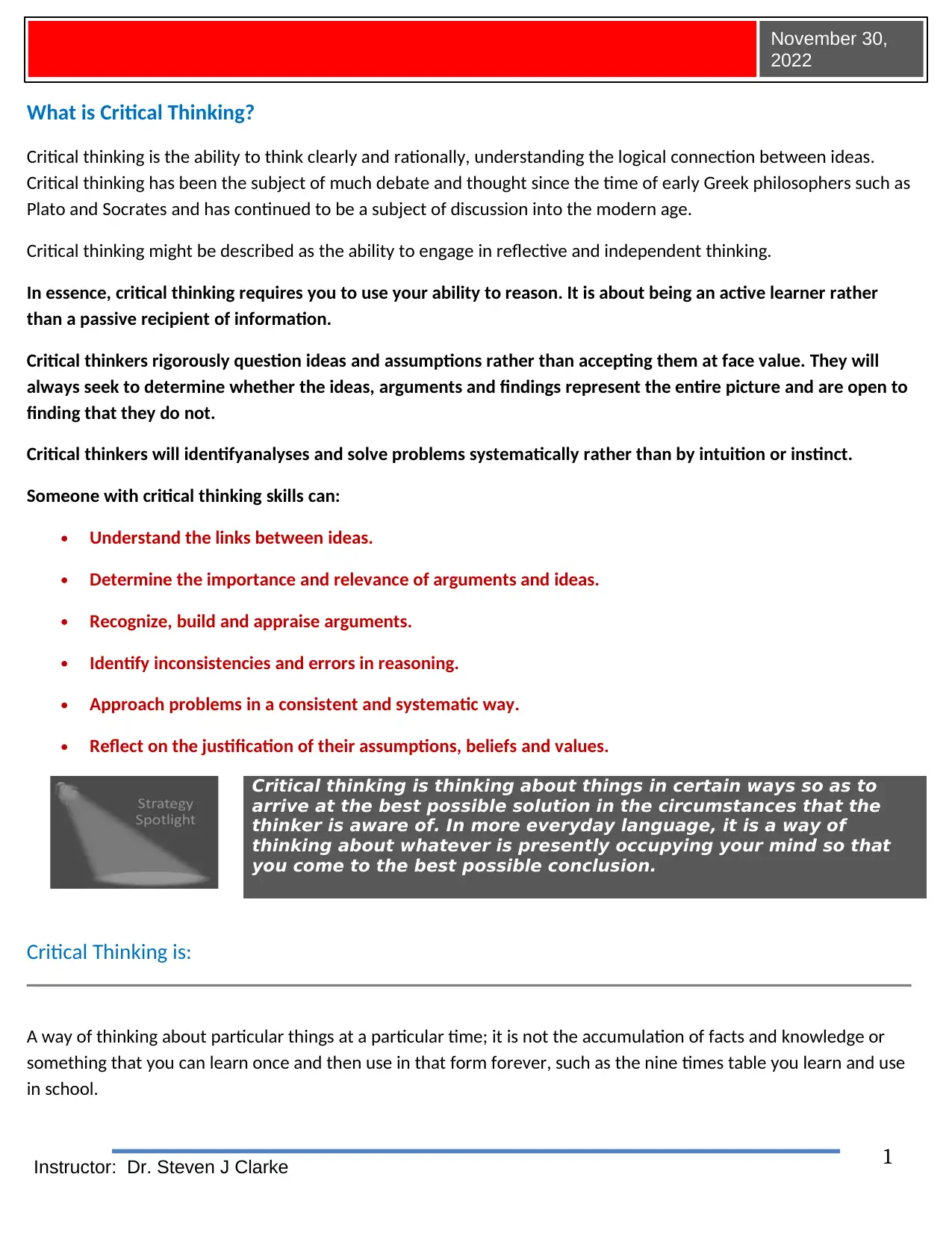
1
November 30,
2022
What is Critical Thinking?
Critical thinking is the ability to think clearly and rationally, understanding the logical connection between ideas.
Critical thinking has been the subject of much debate and thought since the time of early Greek philosophers such as
Plato and Socrates and has continued to be a subject of discussion into the modern age.
Critical thinking might be described as the ability to engage in reflective and independent thinking.
In essence, critical thinking requires you to use your ability to reason. It is about being an active learner rather
than a passive recipient of information.
Critical thinkers rigorously question ideas and assumptions rather than accepting them at face value. They will
always seek to determine whether the ideas, arguments and findings represent the entire picture and are open to
finding that they do not.
Critical thinkers will identifyanalyses and solve problems systematically rather than by intuition or instinct.
Someone with critical thinking skills can:
Understand the links between ideas.
Determine the importance and relevance of arguments and ideas.
Recognize, build and appraise arguments.
Identify inconsistencies and errors in reasoning.
Approach problems in a consistent and systematic way.
Reflect on the justification of their assumptions, beliefs and values.
Critical thinking is thinking about things in certain ways so as to
arrive at the best possible solution in the circumstances that the
thinker is aware of. In more everyday language, it is a way of
thinking about whatever is presently occupying your mind so that
you come to the best possible conclusion.
Critical Thinking is:
A way of thinking about particular things at a particular time; it is not the accumulation of facts and knowledge or
something that you can learn once and then use in that form forever, such as the nine times table you learn and use
in school.
Instructor: Dr. Steven J Clarke
November 30,
2022
What is Critical Thinking?
Critical thinking is the ability to think clearly and rationally, understanding the logical connection between ideas.
Critical thinking has been the subject of much debate and thought since the time of early Greek philosophers such as
Plato and Socrates and has continued to be a subject of discussion into the modern age.
Critical thinking might be described as the ability to engage in reflective and independent thinking.
In essence, critical thinking requires you to use your ability to reason. It is about being an active learner rather
than a passive recipient of information.
Critical thinkers rigorously question ideas and assumptions rather than accepting them at face value. They will
always seek to determine whether the ideas, arguments and findings represent the entire picture and are open to
finding that they do not.
Critical thinkers will identifyanalyses and solve problems systematically rather than by intuition or instinct.
Someone with critical thinking skills can:
Understand the links between ideas.
Determine the importance and relevance of arguments and ideas.
Recognize, build and appraise arguments.
Identify inconsistencies and errors in reasoning.
Approach problems in a consistent and systematic way.
Reflect on the justification of their assumptions, beliefs and values.
Critical thinking is thinking about things in certain ways so as to
arrive at the best possible solution in the circumstances that the
thinker is aware of. In more everyday language, it is a way of
thinking about whatever is presently occupying your mind so that
you come to the best possible conclusion.
Critical Thinking is:
A way of thinking about particular things at a particular time; it is not the accumulation of facts and knowledge or
something that you can learn once and then use in that form forever, such as the nine times table you learn and use
in school.
Instructor: Dr. Steven J Clarke
Paraphrase This Document
Need a fresh take? Get an instant paraphrase of this document with our AI Paraphraser
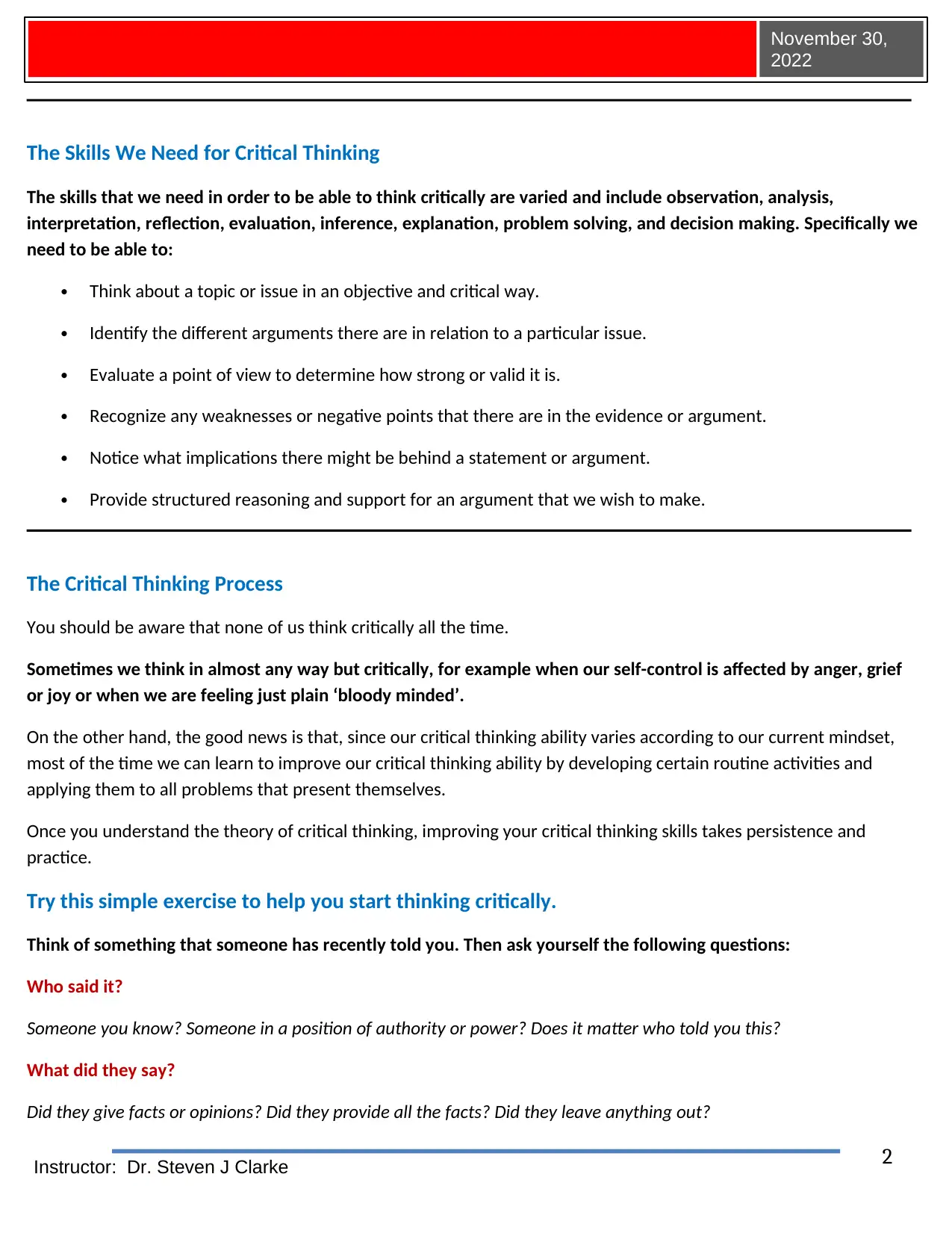
2
November 30,
2022
The Skills We Need for Critical Thinking
The skills that we need in order to be able to think critically are varied and include observation, analysis,
interpretation, reflection, evaluation, inference, explanation, problem solving, and decision making. Specifically we
need to be able to:
Think about a topic or issue in an objective and critical way.
Identify the different arguments there are in relation to a particular issue.
Evaluate a point of view to determine how strong or valid it is.
Recognize any weaknesses or negative points that there are in the evidence or argument.
Notice what implications there might be behind a statement or argument.
Provide structured reasoning and support for an argument that we wish to make.
The Critical Thinking Process
You should be aware that none of us think critically all the time.
Sometimes we think in almost any way but critically, for example when our self-control is affected by anger, grief
or joy or when we are feeling just plain ‘bloody minded’.
On the other hand, the good news is that, since our critical thinking ability varies according to our current mindset,
most of the time we can learn to improve our critical thinking ability by developing certain routine activities and
applying them to all problems that present themselves.
Once you understand the theory of critical thinking, improving your critical thinking skills takes persistence and
practice.
Try this simple exercise to help you start thinking critically.
Think of something that someone has recently told you. Then ask yourself the following questions:
Who said it?
Someone you know? Someone in a position of authority or power? Does it matter who told you this?
What did they say?
Did they give facts or opinions? Did they provide all the facts? Did they leave anything out?
Instructor: Dr. Steven J Clarke
November 30,
2022
The Skills We Need for Critical Thinking
The skills that we need in order to be able to think critically are varied and include observation, analysis,
interpretation, reflection, evaluation, inference, explanation, problem solving, and decision making. Specifically we
need to be able to:
Think about a topic or issue in an objective and critical way.
Identify the different arguments there are in relation to a particular issue.
Evaluate a point of view to determine how strong or valid it is.
Recognize any weaknesses or negative points that there are in the evidence or argument.
Notice what implications there might be behind a statement or argument.
Provide structured reasoning and support for an argument that we wish to make.
The Critical Thinking Process
You should be aware that none of us think critically all the time.
Sometimes we think in almost any way but critically, for example when our self-control is affected by anger, grief
or joy or when we are feeling just plain ‘bloody minded’.
On the other hand, the good news is that, since our critical thinking ability varies according to our current mindset,
most of the time we can learn to improve our critical thinking ability by developing certain routine activities and
applying them to all problems that present themselves.
Once you understand the theory of critical thinking, improving your critical thinking skills takes persistence and
practice.
Try this simple exercise to help you start thinking critically.
Think of something that someone has recently told you. Then ask yourself the following questions:
Who said it?
Someone you know? Someone in a position of authority or power? Does it matter who told you this?
What did they say?
Did they give facts or opinions? Did they provide all the facts? Did they leave anything out?
Instructor: Dr. Steven J Clarke
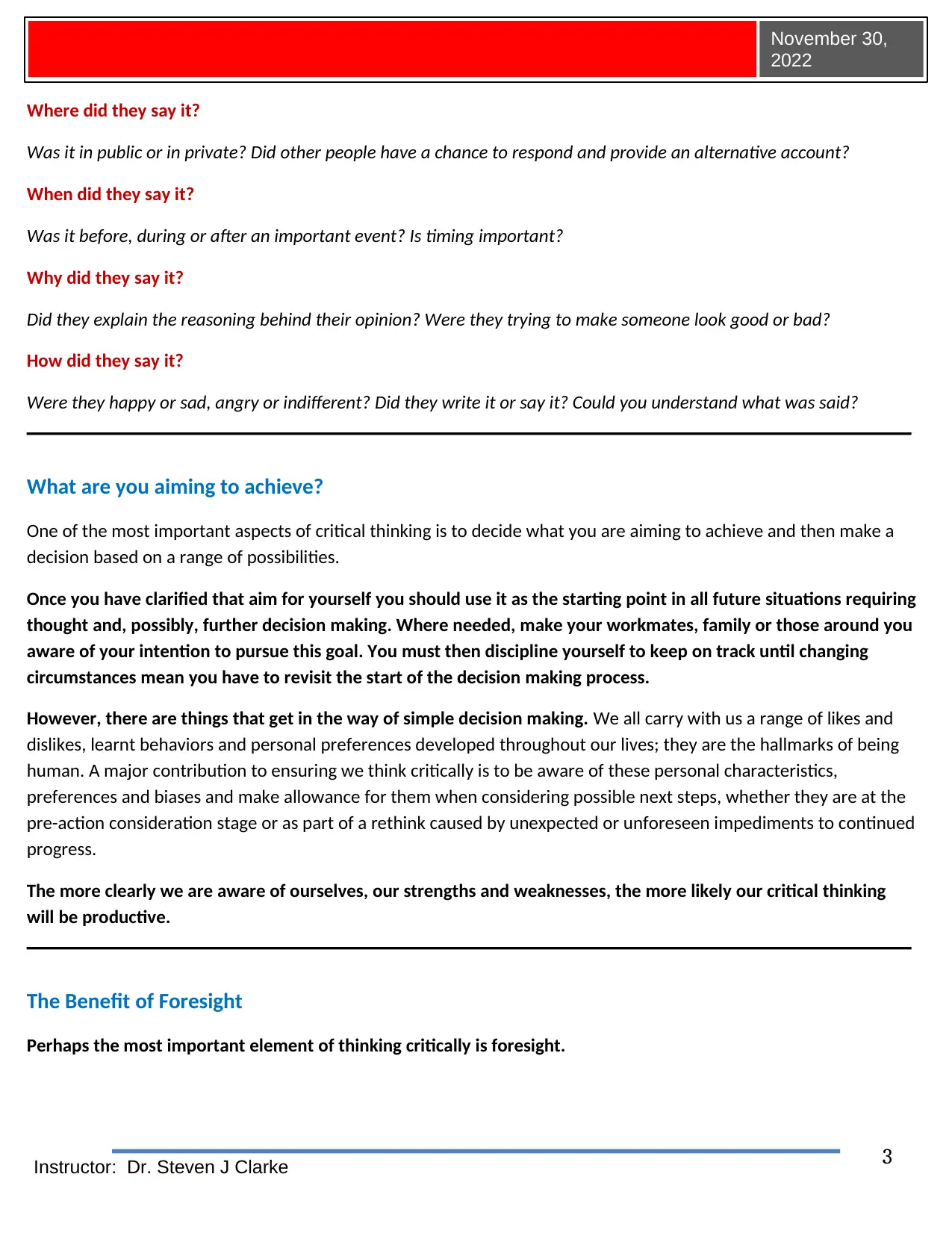
3
November 30,
2022
Where did they say it?
Was it in public or in private? Did other people have a chance to respond and provide an alternative account?
When did they say it?
Was it before, during or after an important event? Is timing important?
Why did they say it?
Did they explain the reasoning behind their opinion? Were they trying to make someone look good or bad?
How did they say it?
Were they happy or sad, angry or indifferent? Did they write it or say it? Could you understand what was said?
What are you aiming to achieve?
One of the most important aspects of critical thinking is to decide what you are aiming to achieve and then make a
decision based on a range of possibilities.
Once you have clarified that aim for yourself you should use it as the starting point in all future situations requiring
thought and, possibly, further decision making. Where needed, make your workmates, family or those around you
aware of your intention to pursue this goal. You must then discipline yourself to keep on track until changing
circumstances mean you have to revisit the start of the decision making process.
However, there are things that get in the way of simple decision making. We all carry with us a range of likes and
dislikes, learnt behaviors and personal preferences developed throughout our lives; they are the hallmarks of being
human. A major contribution to ensuring we think critically is to be aware of these personal characteristics,
preferences and biases and make allowance for them when considering possible next steps, whether they are at the
pre-action consideration stage or as part of a rethink caused by unexpected or unforeseen impediments to continued
progress.
The more clearly we are aware of ourselves, our strengths and weaknesses, the more likely our critical thinking
will be productive.
The Benefit of Foresight
Perhaps the most important element of thinking critically is foresight.
Instructor: Dr. Steven J Clarke
November 30,
2022
Where did they say it?
Was it in public or in private? Did other people have a chance to respond and provide an alternative account?
When did they say it?
Was it before, during or after an important event? Is timing important?
Why did they say it?
Did they explain the reasoning behind their opinion? Were they trying to make someone look good or bad?
How did they say it?
Were they happy or sad, angry or indifferent? Did they write it or say it? Could you understand what was said?
What are you aiming to achieve?
One of the most important aspects of critical thinking is to decide what you are aiming to achieve and then make a
decision based on a range of possibilities.
Once you have clarified that aim for yourself you should use it as the starting point in all future situations requiring
thought and, possibly, further decision making. Where needed, make your workmates, family or those around you
aware of your intention to pursue this goal. You must then discipline yourself to keep on track until changing
circumstances mean you have to revisit the start of the decision making process.
However, there are things that get in the way of simple decision making. We all carry with us a range of likes and
dislikes, learnt behaviors and personal preferences developed throughout our lives; they are the hallmarks of being
human. A major contribution to ensuring we think critically is to be aware of these personal characteristics,
preferences and biases and make allowance for them when considering possible next steps, whether they are at the
pre-action consideration stage or as part of a rethink caused by unexpected or unforeseen impediments to continued
progress.
The more clearly we are aware of ourselves, our strengths and weaknesses, the more likely our critical thinking
will be productive.
The Benefit of Foresight
Perhaps the most important element of thinking critically is foresight.
Instructor: Dr. Steven J Clarke
⊘ This is a preview!⊘
Do you want full access?
Subscribe today to unlock all pages.

Trusted by 1+ million students worldwide
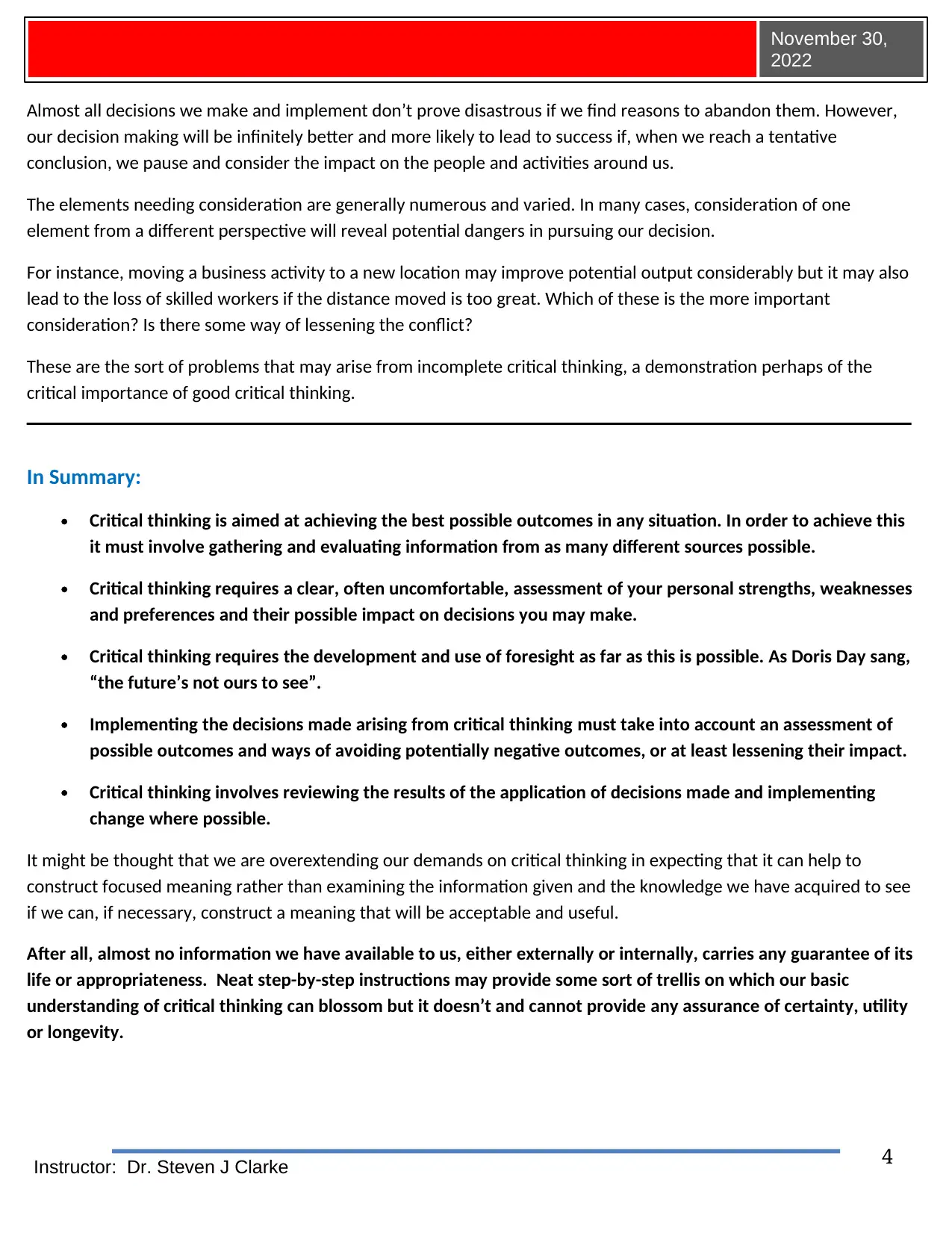
4
November 30,
2022
Almost all decisions we make and implement don’t prove disastrous if we find reasons to abandon them. However,
our decision making will be infinitely better and more likely to lead to success if, when we reach a tentative
conclusion, we pause and consider the impact on the people and activities around us.
The elements needing consideration are generally numerous and varied. In many cases, consideration of one
element from a different perspective will reveal potential dangers in pursuing our decision.
For instance, moving a business activity to a new location may improve potential output considerably but it may also
lead to the loss of skilled workers if the distance moved is too great. Which of these is the more important
consideration? Is there some way of lessening the conflict?
These are the sort of problems that may arise from incomplete critical thinking, a demonstration perhaps of the
critical importance of good critical thinking.
In Summary:
Critical thinking is aimed at achieving the best possible outcomes in any situation. In order to achieve this
it must involve gathering and evaluating information from as many different sources possible.
Critical thinking requires a clear, often uncomfortable, assessment of your personal strengths, weaknesses
and preferences and their possible impact on decisions you may make.
Critical thinking requires the development and use of foresight as far as this is possible. As Doris Day sang,
“the future’s not ours to see”.
Implementing the decisions made arising from critical thinking must take into account an assessment of
possible outcomes and ways of avoiding potentially negative outcomes, or at least lessening their impact.
Critical thinking involves reviewing the results of the application of decisions made and implementing
change where possible.
It might be thought that we are overextending our demands on critical thinking in expecting that it can help to
construct focused meaning rather than examining the information given and the knowledge we have acquired to see
if we can, if necessary, construct a meaning that will be acceptable and useful.
After all, almost no information we have available to us, either externally or internally, carries any guarantee of its
life or appropriateness. Neat step-by-step instructions may provide some sort of trellis on which our basic
understanding of critical thinking can blossom but it doesn’t and cannot provide any assurance of certainty, utility
or longevity.
Instructor: Dr. Steven J Clarke
November 30,
2022
Almost all decisions we make and implement don’t prove disastrous if we find reasons to abandon them. However,
our decision making will be infinitely better and more likely to lead to success if, when we reach a tentative
conclusion, we pause and consider the impact on the people and activities around us.
The elements needing consideration are generally numerous and varied. In many cases, consideration of one
element from a different perspective will reveal potential dangers in pursuing our decision.
For instance, moving a business activity to a new location may improve potential output considerably but it may also
lead to the loss of skilled workers if the distance moved is too great. Which of these is the more important
consideration? Is there some way of lessening the conflict?
These are the sort of problems that may arise from incomplete critical thinking, a demonstration perhaps of the
critical importance of good critical thinking.
In Summary:
Critical thinking is aimed at achieving the best possible outcomes in any situation. In order to achieve this
it must involve gathering and evaluating information from as many different sources possible.
Critical thinking requires a clear, often uncomfortable, assessment of your personal strengths, weaknesses
and preferences and their possible impact on decisions you may make.
Critical thinking requires the development and use of foresight as far as this is possible. As Doris Day sang,
“the future’s not ours to see”.
Implementing the decisions made arising from critical thinking must take into account an assessment of
possible outcomes and ways of avoiding potentially negative outcomes, or at least lessening their impact.
Critical thinking involves reviewing the results of the application of decisions made and implementing
change where possible.
It might be thought that we are overextending our demands on critical thinking in expecting that it can help to
construct focused meaning rather than examining the information given and the knowledge we have acquired to see
if we can, if necessary, construct a meaning that will be acceptable and useful.
After all, almost no information we have available to us, either externally or internally, carries any guarantee of its
life or appropriateness. Neat step-by-step instructions may provide some sort of trellis on which our basic
understanding of critical thinking can blossom but it doesn’t and cannot provide any assurance of certainty, utility
or longevity.
Instructor: Dr. Steven J Clarke
Paraphrase This Document
Need a fresh take? Get an instant paraphrase of this document with our AI Paraphraser
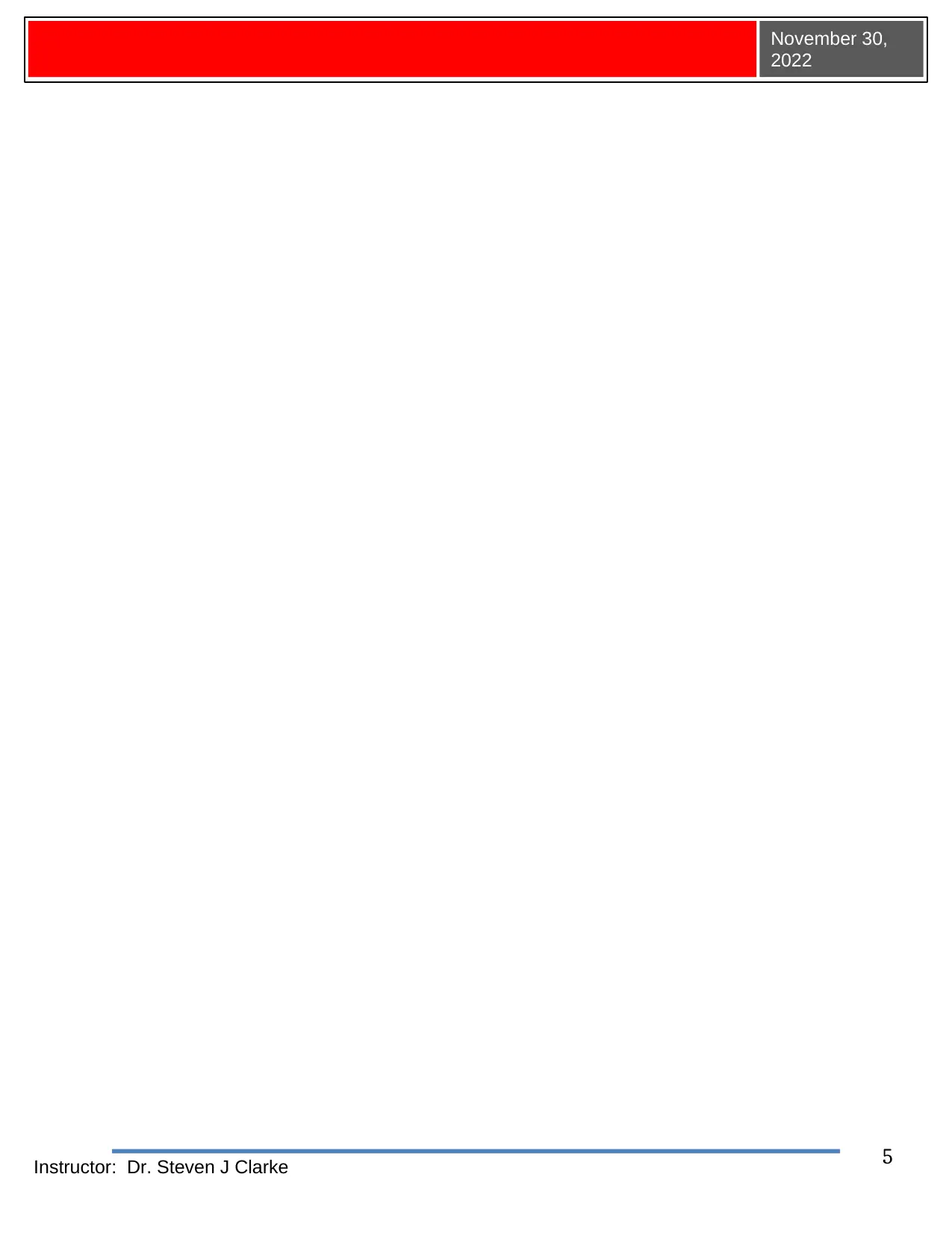
5
November 30,
2022
Instructor: Dr. Steven J Clarke
November 30,
2022
Instructor: Dr. Steven J Clarke
1 out of 5
Related Documents
Your All-in-One AI-Powered Toolkit for Academic Success.
+13062052269
info@desklib.com
Available 24*7 on WhatsApp / Email
![[object Object]](/_next/static/media/star-bottom.7253800d.svg)
Unlock your academic potential
Copyright © 2020–2026 A2Z Services. All Rights Reserved. Developed and managed by ZUCOL.





